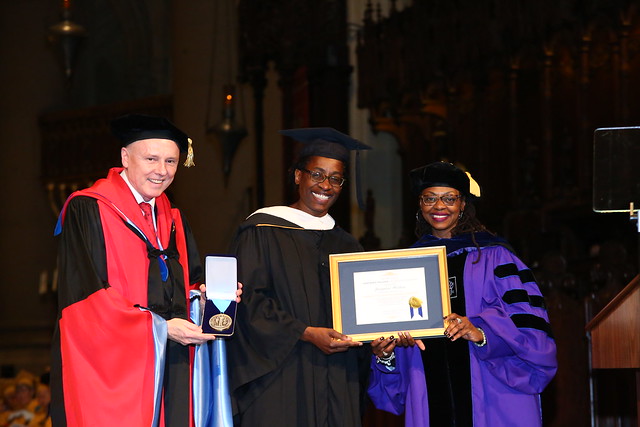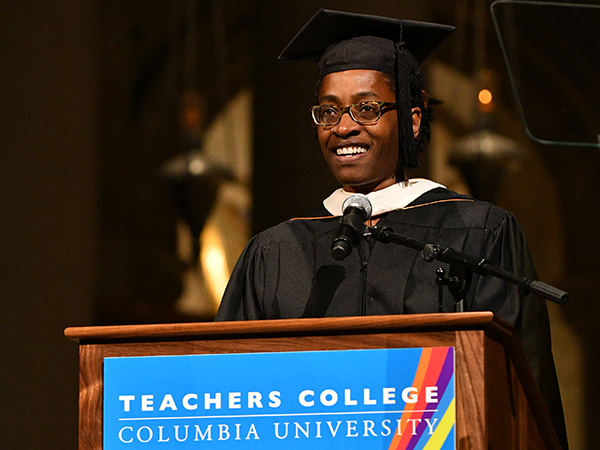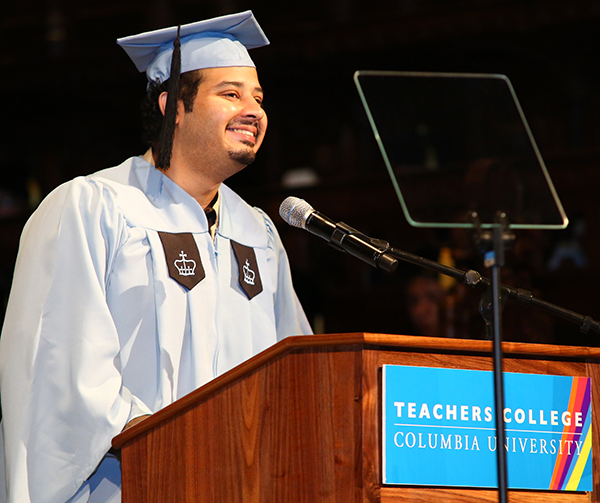Rewriting the Narrative: At TC’s first master’s degree ceremony, a focus on civic education as an antidote to a world with no fairytale endings

“We must conclude that the time has come to revive civic education for today’s multicultural, multiracial, multiethnic, digital society,” TC President Susan Fuhrman told graduates of TC’s Departments of Arts & Humanities and Curriculum & Teaching at the first of the College’s three master’s degree Convocation ceremonies this week. Created during the late 19th and early 20th centuries in large part because institutions such as Teachers College were helping new immigrants join American society, civic education has been “squeezed out” in recent decades by “an ever narrower focus on testing math and reading skills,” Fuhrman said, with an accompanying rise in racial and cultural stereotyping, violence against people of color, women, and LGBT individuals, the prevalence of fake news and the divisiveness of the U.S. political climate. But now, she said to cheers, TC – “the largest and best school of education in the world – OK, the planet” – has launched a major new initiative to redesign, reinvigorate, and re-establish civic education for the 21st century.
“The lessons of critical thinking, civil dialogue and public engagement must go hand in hand with an unshakeable commitment to confront prejudice and discrimination.”
— TC President Susan Fuhrman
“And this time, the lessons of critical thinking, civil dialogue, and public engagement must go hand-in-hand with an unshakeable commitment to confront prejudice and discrimination, and to secure safety, opportunity, and equality for all.”
Speaking after Fuhrman, the National Book Award-winning writer Jacqueline Woodson – author of the memoir-in-verse Brown Girl Dreaming, the novels Locomotion and Feathers, and other titles for young adults and children – remarked on the moment in children’s literature when “the stories change to tales where there is no longer a happy ending” and where suddenly “no perfectly fitted glass slipper brings about a happily ever after, no straw spun to gold defeats Rumpelstiltskin, no pea beneath a mattress ends in some hetero-normative, very white world of marriage and Queendom.”
Woodson recalled a school appearance at which she read the bittersweet ending to one of her books, only to have a third grade boy stand up, enraged, and tell her that the characters were supposed to become friends.

“You will face again and again the enraged boy who doesn’t think the story should end this way,” she told graduates. “And you will agree with him and say ‘No it shouldn’t, so how will you, my thoughtful child, go out and change the narrative?’” The key, she suggested, will be equipping that boy, and all students, for life in a time when “we know we are meeting the bully head-on – [when]someone is saying to them – someone who is supposed to be powerful and thoughtful and leader of a country – that who they are doesn’t matter.”

Student speaker Usama Javed Mirza, who was receiving his master’s degree in Curriculum & Teaching, offered hope born of his own experiences in the United States. Mirza began his speech with a simple declaration:
“My name is Usama, and I am from Pakistan.”
He let those words echo for a moment, then confided that he had been “contemplating the impact of saying them for more than two years,” since he first learned of his acceptance to TC and imagined calling his future roommate.
“I thought of introducing myself as Javed, or Mirza, or even M.J.,” he said, to laughter. “And my fears grew when I arrived at the airport in New York City and was taken aside for examination.”
Yet stepping out of the airport into New York City was like “stepping into an ocean – a beautiful sight” filled with people from all cultures and all walks of life. And the very best thing, Mirza said, was arriving at TC and “realizing that I, a man from Pakistan called Usama, felt welcome.”
TC is “a fortress for the movement for social justice,” Mirza said, adding that he has been “transformed by seeing the courage and love of educators fighting for their students to have a place in their schools where they feel loved.”
Related Stories
Published Monday, May 15, 2017